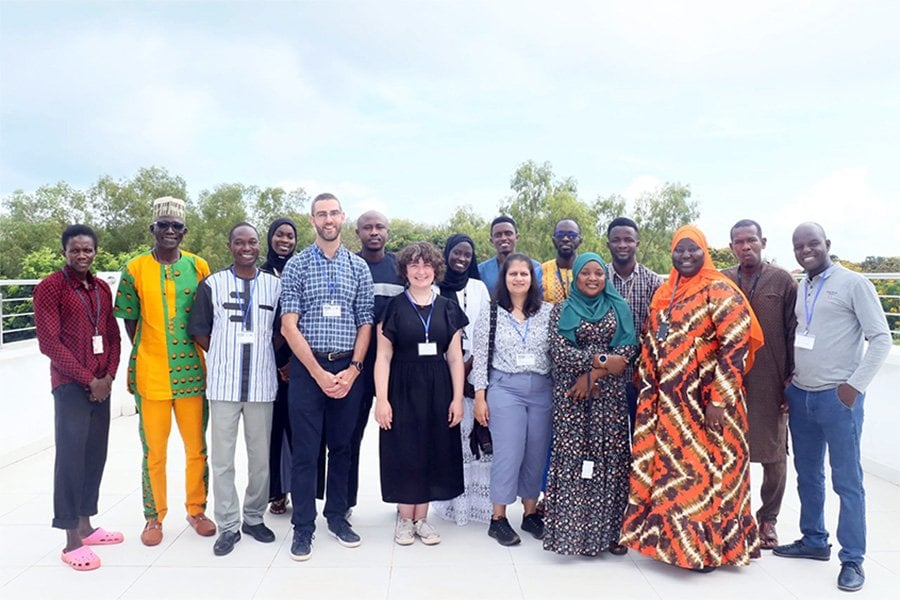
Photo credit: MRCG at LSHTM/Mamud Joof
As part of the Gates Foundation funded project, the team is investigating whether malaria is a risk factor for the development of severe COVID-19 (MALCOV), while investigating the patterns of SARS-CoV-2 infection and the molecular epidemiology of SARS-CoV-2 across two study sites in Burkina Faso and Kenya.
The visiting team, comprising five (5) researchers from the UK and Burkina Faso, were in The Gambia to evaluate a new diagnostic method and characterise SARS-CoV-2 viruses from field samples collected during the MALCOV study in Burkina Faso. During this visit, the team conducted data analysis for this new method, alongside equivalent training and data generation in quantitative real-time PCR-based and next generation sequencing techniques.
The team sequenced 112 samples collected in Burkina Faso as part of the MALCOV study. They performed viral load measurements on these samples, determined SARS-CoV-2 variants by whole genome sequencing, and used the variant-calling assay developed to demonstrate its application to real-world samples.
Dr David Allen led the visiting team, and expressed his appreciation of the Unit’s facilities saying, “The laboratories at the Unit, including both the new Microbiology Laboratory building and the refurbished genomics centre, integrate modern laboratory design which supports complex workflows equipped with state-of-the-art equipment for PCR-based analysis of samples and for whole genome sequencing, from sample processing to library preparation to high-throughput data generation.”
He added, “The opportunity to visit and work at the MRCG at LSHTM, accessing cutting-edge facilities and equipment, and working with the dynamic and friendly team, makes it clear why the Unit is becoming a hub for research and training in molecular microbiology within West Africa and beyond.”
Dr Issiaka Soulama, the Head of Molecular Biology at Groupe de Recherche Action Santé (GRAS) remarked, “I was very impressed by the biotechnological platform and the progress made in quality management since my last visit in 2020. This is a great opportunity for me to see some of the equipment for the first time in the genomics lab. I definitely think the MRCG at LSHTM represents a great opportunity for genomics training, and I hope to come again.”
During the visit, the team worked closely with highly skilled scientists from the Unit’s Genomics Strategic Core Platform, providing training and sharing knowledge, skills, and expertise.
Dr Abdul Karim Sesay, Head of the Genomics Core Platform said, “I am really pleased that the genomics facility and the wonderful team I support at the MRCG at LSHTM were able to support David and his team to conduct this training. We are honoured to have the opportunity to work with him and his team to support and build capacities of scientists in our sub-region in molecular techniques and genomics. Our team will be looking forward to more fruitful collaboration with David and other scientists at LSHTM in London.”
Caitlin Greenland-Bews, PhD student at the Liverpool School of Tropical Medicine (LSTM) said, “Our assay is designed to be a cheap and a quick method of detecting variants of concern. With access to the MRCG at LSHTM’s amazing facilities, we were able to process a lot of samples in a short period of time. This wouldn’t have been possible without the support of their wonderful, experienced team who are experts in advanced genomics and molecular diagnostic sciences. I can’t wait to work with them in future collaborations and look forward to our next visit.”
As part of this new collaboration, earlier this year, Sona Jabang, a Higher Scientific Officer at the MRCG at LSHTM travelled to LSHTM and received training on high-containment virology and virus culture, and to conduct studies on virus shedding during COVID-19 using samples collected in The Gambia, through the European & Developing Countries Clinical Trials Partnership (EDCTP) funded COVADIS project.
Sona will work with David’s team to develop new collaborations and implement new technologies at the MRCG at LSHTM.
If you enjoyed this article and would like to build a career in global health, we offer a range of MSc programmes covering health and data, infectious and tropical diseases, population health, and public health and policy.
Available on campus or online, including flexible study that works around your work and home life, be part of a global community at the UK's no.1 public health university.

